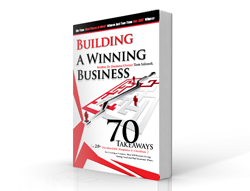Embrace Limitations for Better Solutions
Thanks to my sister for getting me hooked back onto Ted Talks. This 10 minute video by Phil Hansen “Embrace the Shake” demonstrates how limitations create better solutions.
Thanks to my sister for getting me hooked back onto Ted Talks. This 10 minute video by Phil Hansen “Embrace the Shake” demonstrates how limitations create better solutions.
A couple of years ago, I wrote “Lessons from My Father” for Octane, The Entrepreneur’s Organization Magazine. While some of you may have seen this before, below is a copy…
Lessons from My Father
For many, Father’s Day is a holiday of the worst possible definition: a phony event designed to sell cards and neck ties.
For me, though, this Father’s Day has special poignancy: It’s the first time I’ll be celebrating as a dad myself, and the first time that I won’t be able to tell my own dad how much he means to me.
My father, Theodore, died last year in a farming accident. It was a terrible shock, to say the least, and it put my life in perspective. In the months since, I find myself remembering all the things he taught me; lessons that I want to teach Theodore, my young son.
In 2001, a local newspaper published an article about how my company, Intertech, was named one of the 500 fastest growing firms in the nation. In the article, I credited some of my success to simple lessons that my dad taught me. Now I realize that my dad taught me so much more, and those lessons have been critical to my company’s ongoing success.
“Tell the truth and you’ll only have one story to remember” was one of his favorite sayings. After being in business for 20 years, I have repeatedly experienced the merit of my dad’s wisdom. Recently, an important client of ours hired a CIO who turned out to be a dishonest bully. He hoped posturing, changing his story and saying whatever would resonate with me would make me complicit with his deceit. It didn’t. The company fired him, but Intertech is still engaged.
This particular experience taught me that while it’s easy to encourage others to tell the truth, it’s harder to create an environment where truth–telling feels safe. To create an atmosphere of honesty, I’ve learned to support people when they fail. I also encourage my managers to tell those people who make mistakes that they’re OK. I’ll never forget how grateful I was when my dad did that for me.
“If you do nothing, you won’t make any mistakes” were his first words after I accidently sheared the axle on his truck when I was a teenager. After reminding me that only those who do nothing are perfect, he said, “Now let’s go take a look at the truck.” No shaming reprimand; just a straightforward focus on solutions. When mistakes happen in my business, I acknowledge it, learn from it and move on to the next step. At the end of the day, the mistakes are what make us great.
“If someone does something you don’t agree with, tell him directly” was another belief my dad modeled. He wasn’t confrontational, but he did speak his mind if he disagreed or had something corrective to say. When I asked him if this was hard to do, he would just shrug his shoulders and say, “I’m not trying to win a popularity contest.” I was able to apply this lesson when a valued business partner of mine messed up. We talked through the issue and he realized that, while I recognized his mistake, I was more concerned about the future of our company and his role in helping us move forward. I’m happy to say that he’s still with us today.
While popularity wasn’t his goal, my dad was beloved by many. At his funeral, many people recalled stories of how he turned their lives around or did good work. It made me realize that sharing sincere praise is precious. This is something I have institutionalized within my company with a program that encourages employees to nominate each other for demonstrating our company values. Sometimes as leaders we get so busy that we don’t give people the acknowledgement they need to excel. At the end of the day, awareness begets success.
My dad was a modest farmer, but he left a rich legacy of integrity, authenticity and kindness. His wisdom has helped me grow as a business owner and father. I only hope I can be at least half as effective in passing that legacy on to his namesake.
Mother’s Day is Sunday, May 12.
Whether your a son or a mom to a son, there’s a fascinating piece in this month’s issue of The Atlantic that describes some surprising results from one of the longest running longitudinal studies of human development.
The project, which began in 1938, has followed 268 Harvard undergraduate men for 75 years, “measuring an astonishing range of psychological, anthropological, and personal traits—from personality type to IQ to drinking habits to family relationships—in an effort to determine what factors contribute most strongly to human flourishing.”
Turns out that our relationships with our mothers matter – a lot! Specifically:
Happy Mother’s Day to my mom and my wife!
 Giving, no matter the reason, is crucial to living a balanced, successful life. Further, I think the very approach taken in giving should be balanced as well. By this I mean, it is better to have a planned and systematic approach to philanthropy. And it’s important to give consistently, not just when believed affordable. It’s been said, “The best way to know you have enough of something is to give part of it away.” I agree.
Giving, no matter the reason, is crucial to living a balanced, successful life. Further, I think the very approach taken in giving should be balanced as well. By this I mean, it is better to have a planned and systematic approach to philanthropy. And it’s important to give consistently, not just when believed affordable. It’s been said, “The best way to know you have enough of something is to give part of it away.” I agree.
In my book, Building a Winning Business, I devote chapter 69 to this topic (“Embrace Corporate Responsibility”). Intertech’s approach has been to create a separate organization that’s a company-sponsored foundation. The purpose of the foundation is giving financial support to cash-strapped families with terminally ill children. Intertech has donated $175,000 to the foundation.
As important as financial giving, we have focused volunteering. Every few months, we throw a birthday party for families staying at the local Ronald McDonald House. The parties start with cake and crafts and finish with a piñata. The piñata is the recipient of violence and source of smiles. Most of the kids at the party are family members of a sibling at the hospital… my hope is the parties provide a brief moment to return to just being kids.
We are more engaged, I believe, than ever. While not the goal, some new employees have shared that our company’s visible commitment to philanthropy is a point of difference as they weighed various employment options.
Turns out that getting some balance through giving back is highly valued – a real win-win for us and the community.
 It’s one thing for the owner and CEO of a company to structure his work to accommodate his life, and quite another to consciously build a business culture that allows employees to do the same. But without being boastful, that is exactly what we have done at Intertech. Our efforts have been rewarded with an extraordinarily loyal group of employees, many satisfied customers and a growing number of “Best Places to Work” awards.
It’s one thing for the owner and CEO of a company to structure his work to accommodate his life, and quite another to consciously build a business culture that allows employees to do the same. But without being boastful, that is exactly what we have done at Intertech. Our efforts have been rewarded with an extraordinarily loyal group of employees, many satisfied customers and a growing number of “Best Places to Work” awards.
In my book, Building a Winning Business, I dedicate eight takeaways to building a people-centered business culture, as well as multiple leadership chapters dealing with this important topic. Some of our strategies include offering job sharing options, giving our employees a three-month sabbatical after seven years of consecutive service, work from home, and nine, nine-hour days.
We also strive to “think first to work smart.” In my book, I dedicate takeaway #47 to this concept, reminding readers: “Don’t get caught in a mindless activity trap. Instead, take time each day to think about the project and make decisions thoughtfully. Encourage your team to keep balance by working smart during the workday and saving “crunch time” for the real crunch periods. It’s consistency over time that makes the real difference in the end.”
Respecting employees as people who need work/life balance, we have created a productive, upbeat culture where people and business can thrive. Sadly, many organizations do not value work/life balance and they are paying a price. A Gallup poll taken two years ago said disengaged employees are costing industries $416 billion a year.
At Intertech, it’s just the opposite. We completed 2012 as our our best sales year ever. Helping employees find balance actually appears to be quite good for the balance sheet! Next and last post in this series will focus on finding balance between business and community.